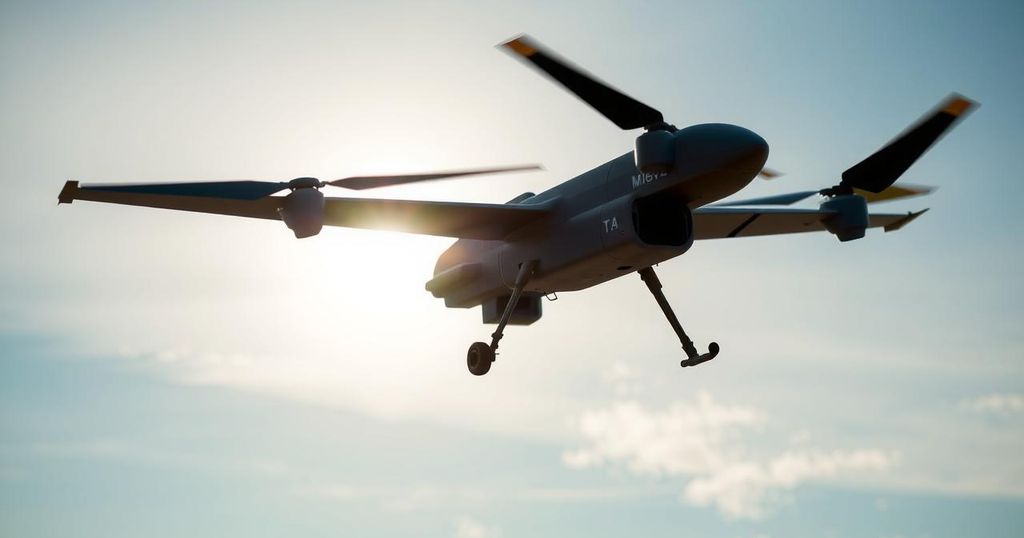Kurdish Official Denies Drone Acquisition from Iran, Critiques Turkish Propaganda

A Kurdish military official rejected claims of drone acquisition from Iran, asserting they are basic self-made technologies. He criticized the Turkish media for spreading propaganda to undermine their image. The Kurdish region in Syria is said to be the safest area amid ongoing Turkish hostilities, as the official expresses concerns about potential collaborations between Turkey and the new Syrian regime. He recognizes Israel’s historical significance and expresses a longing for future cooperation.
A Kurdish military official firmly denied claims that Kurdish forces acquired drones from Iran, asserting these allegations are merely Turkish propaganda. During a video call with The Jerusalem Post, he emphasized that their drone capabilities are modest and developed internally by their fighters. The official criticized the Turkish outlet Yeni Safak, indicating it serves the interests of Turkish President Erdogan and aims to misrepresent the Kurds’ image, branding them as connected to extremist regimes.
In discussing the current status of Kurdish-controlled regions in Syria, the official claimed that they oversee 30-35% of the territory, dubbing it the safest area in the country amidst continued Turkish aggression. He expressed concern regarding Erdogan’s expansionist objectives, which threaten Kurdish autonomy. In response to Yeni Safak’s assertions, the Kurdish-led Syrian Democratic Forces refuted the claims, stating that their drones result from local expertise, not foreign support.
Historically, tense relations persist between the Kurdish minority and the Turkish state due to ethnic strife and aspirations for Kurdish independence. The Kurds, constituting around 15-20% of Turkey’s population, face continuous attacks from Turkish forces who label them as terrorists. The Kurdish official equated Turkish actions to those of Iran, insinuating that Turkey seeks to suppress Kurdish autonomy as both nations harbor enmity towards the grouping.
The official conveyed apprehension regarding the new Syrian administration’s relationship with Turkey, highlighting that many Kurds in Turkey have been ethnically cleansed from their ancestral lands. He conveyed skepticism about the prospects for Kurdish rights and autonomy amid the chaotic Syrian landscape, fearing a resurgence of extremist factions.
Expressing a desire for collaboration, the official noted that Israel’s historical and cultural importance in the region could facilitate peace. He underscored the obstacles present due to the current political climate that hinders open partnerships. Despite keeping his identity concealed, he acknowledged Israel’s potential to foster stability in the Middle East.
The military official’s insights reflect significant geopolitical tensions in the region, with Kurdish forces navigating threats from both Turkey and extremist groups amid a striving for autonomy. The position of Kurdish regions in Syria continues to be fragile, complicated by external influences and internal challenges, while their desire for recognition and cooperation remains poignant.
The Kurdish population in Turkey and neighboring regions has a long history of conflict with the Turkish state, primarily revolving around issues of autonomy and ethnic identity. Kurdish groups have sought self-governance, particularly in Syria, where they control significant territories. Turkish officials often frame these movements as terrorism, specifically linking Kurdish forces to the PKK, a group designated as a terrorist organization by Turkey. The geopolitical dynamics of the Middle East have led to complex relationships, particularly with neighboring nations such as Iran and Syria, which also affect Kurdish aspirations.
The Kurdish military official’s statements clarify that allegations of drone acquisition from Iran are unfounded, characterizing them as anti-Kurdish propaganda by Turkish media. The Kurdish forces assert their autonomy and capabilities, emphasizing the importance of their local developments. Historical tensions highlight the challenges faced by Kurds in Turkey and Syria, reinforcing the need for international support and understanding in the pursuit of peace and stability in the region.
Original Source: www.jpost.com








